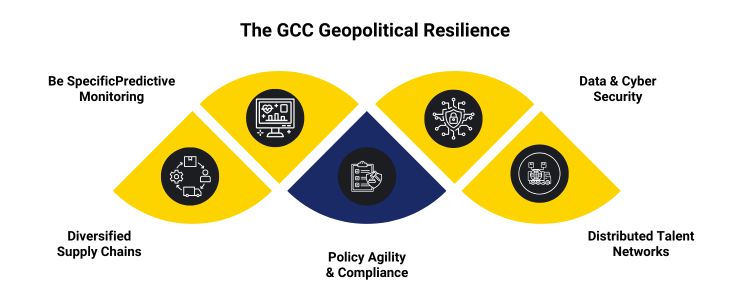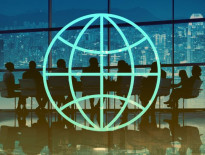
In September 2025, the U.S. visa policy rearranged the dominoes of boardroom choices: over one hundred American corporations hastened the transfer of their jobs to the Global Capability Centres (GCCs) in India to avoid the increasing cost of H-1B. At the same time, the Maharashtra state government accepted an overarching GCC Policy 2025, with a target of 400 new centers and a promise of 50,600 crore in incentives to establish 400,000 jobs. These trends provide a strong message: geopolitics ceases to be a peripheral problem; it is at the center of the global expansion. There are currently more than 1,900 GCCs in India, which are creating multibillion values and providing two million individuals with employment in key areas. These hubs are also vulnerable to abrupt changes in trade, sanctions, currency fluctuations, and disruptions in the supply chain. Leaders who integrate geopolitical threat mitigation as an integral part of their international business strategy and not an epilogue will safeguard their transnational growth, maintain their growth trajectory, and achieve greater economic benefits in the next number of years.
The GCCs no longer undertake just cost arbitrage but capability arbitrage also with operating R&D, regulatory strategy, and product teams in the global firms. This makes them more strategically important in any geopolitical conflict. According to the latest surveys and estimates, political and regulatory uncertainty is taking the first position after supply-chain shocks. GCC leaders interpret this as a result of talent mobility, broken supply chains, and legislative requirements for real-time data on-premise.
A separate mitigation playbook and constant scenario testing are needed in each of these dimensions. Recent risk reports underline the fact that it is more profitable to see geopolitical risk as an enterprise-wide strategic asset and not merely as insurance.
This playbook bridges the gap between global business strategy and the operational steps that can be implemented instantly for GCC contracts, cloud options, hedges, and talent mapping. The empirical moral: even minor structural modifications, such as the introduction of a second supplier or a local data center, can often avoid disastrous downstream expenses.
Instead of being an expense, geopolitical preparedness is a component of a GCC model. It is challenging for GCCs to continue to operate, have high-quality clients, and grow across borders more quickly without the need to stop and restart. States have become GCC growth promoters; various states in India have declared policies and targets on new centers and employment creation, which strengthens the competitive advantage of centers and can expand safely and in a result-compliant manner. Policy assistance and embedded risk management reduce the distance between domestic and international investment.
This flow makes geopolitical threat mitigation a repeatability, rather than a scramble response.
The two trends will prevail in the coming five years: predictive geopolitics (AI models that predict changes in policy) and distributed delivery (smaller and regionally balanced hubs). GCCs that bring together domain knowledge and advanced scenario analytics coupled with elastic operating architectures will lead the race to go global. Resilience should be measured by leaders’ age on revenue: baseline, target, and delta. By so doing, mitigation is repositioned as a performance enabler to international business strategy.
The aspect of geopolitical uncertainty will continue to be a part of international trade. To the GCC leaders, it is crystal clear to convert uncertainty into strategic optionality. Engraving risk tracking, supply and talent footprint diversification, and making financial protection more in line with business objectives, GCCs will not merely withstand shocks; they will continue to build cross-border momentum and long-term growth.
Ready to mobilize your GCC to a global business approach? Consult Inductus GCc to begin your business journey, draw single points of failure, and select three quick wins: one technical, one contractual, and one talent-related. Such a strategic move will transform weakness into a strength.
A GCC is an offshore facility of a multinational company that undertakes niche roles such as research and development, information technology service and strategic management. It is a government program that gives the women entrepreneurs up to 1 crore in bank loans to fund greenfield projects. Personal responsibilities and unconscious bias are the factors that lead to their mid-career attrition and slow them down in their careers. They introduce new ideas, understanding, and team-oriented leadership that speeds up the advancement of such areas as AI and cybersecurity. By 2030, women are expected to take up 25-30 per cent of GCC leadership positions, which will be paramount to the growth of the Indian market. Aditi, with a strong background in forensic science and biotechnology, brings an innovative scientific perspective to her work. Her expertise spans research, analytics, and strategic advisory in consulting and GCC environments. She has published numerous research papers and articles. A versatile writer in both technical and creative domains, Aditi excels at translating complex subjects into compelling insights. Which she aligns seamlessly with consulting, advisory domain, and GCC operations. Her ability to bridge science, business, and storytelling positions her as a strategic thinker who can drive data-informed decision-making.
Importance of Geopolitical Risk to GCCs
Five Dimensions of Risks

Strategic Playbook
Challenge
Immediate Action
Outcome (12–24 months)
Trade barriers/sanctions
Multi-country sourcing; ‘dual-sourcing’ contracts
Continuity during trade shock
Data residency laws
Hybrid cloud + local gateways; legal playbooks
Faster compliance, lower fines
Talent mobility
Distributed talent hubs; local L&D pipelines
Reduced single-country risk
Currency & policy volatility
Institute dynamic hedging and adjustable pricing provisions.
Protected margins
Cyber and supply attacks
Supply chain cyber audits and zero-trust security.
Reduced breach impact
Economic Benefits
Developing the Resilient GCC Operating Model
Future Perspective
Conclusion
frequently asked questions (FAQs)

Aditi
Hey, like this? Why not share it with a buddy?
Related Posts
Recent Blog / Post
- The Role of GCCs in Accelerating Corporate R&D and IP Creation November 4, 2025
- Navigating Geopolitical Risks: A Guide for GCC Leaders November 4, 2025
- Why Mid-Sized Companies are Embracing the GCC Model October 16, 2025
- What Is A Global Capability Center (GCC), and Why Is It Essential For Modern Business? October 16, 2025
- Gurugram’s Tech Ascent: Decoding the New Haryana GCC Policy October 15, 2025
- Scaling Your Tech Team: A Beginner’s Look at the Offshore Development Center October 15, 2025
- Agile Methodologies for GCCs: A Blueprint for Success October 6, 2025
- The Legal and Compliance Checklist for a New GCC Setup October 4, 2025
- The Rise of Niche GCCs: A Focus on Specialised Capabilities October 4, 2025
- The Impact of Regulatory Changes on GCC Operations October 4, 2025
- Cybersecurity for GCCs: A Proactive Approach to Data Protection September 30, 2025
- Beyond Cost: Measuring the True ROI of Your GCC Investment September 29, 2025
- The Future of GCCs in the Retail Sector: A Strategic Playbook September 29, 2025
- David vs Goliath: Mid-Sized GCCs Quietly Outperform the Big Brands September 29, 2025
- Infineon’s Big Bet on India: Inside Its First GCC in GIFT City September 29, 2025
















